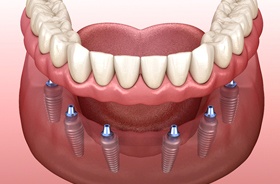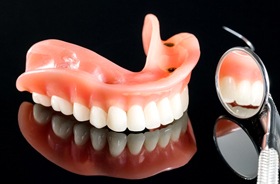Dental Implant Failure & Salvage – Auburn, ME
Preserving Your Restored Smile
Dental implants are consistently successful — they boast a success rate of more than 95%. Even 10 years after their initial treatment, most patients are still fully enjoying their new teeth. However, there is always a small chance of a failed dental implant in Auburn. If you ever believe that something is amiss with your dental implants, call us right away. We will evaluate the problem and recommend a treatment plan. We will do all we can to preserve your restored smile.
Why Do Dental Implants Fail?

The most common cause of dental implant failure is an infection known as a peri-implantitis. It occurs when bacteria attack the tissue around a dental implant. Eventually, the damage to the gums and bone can become so severe that the implant no longer has a reliable base of support. Poor oral hygiene is often the cause of peri-implantitis.
Other factors that can contribute to dental implant failure include:
- Physical trauma
- A failure of the dental implant to bond with the surrounding bone
- Certain medical conditions that affect the body’s ability to support dental implants.
Symptoms of Failed Dental Implants

Dental implant failure can occur at any time. Early failure happens shortly after the initial dental implant surgery, while late failure can occur at any time, even decades after the initial treatment.
Symptoms of early and late failure can include:
- Severe pain. Some discomfort is normal after the initial implant surgery. However, severe pain and pain that occurs after you have adjusted to your dental implants are causes for concern.
- An implant feels loose. In some cases, this is just a problem with the implant restoration. In other cases, it stems from the implant itself.
- Signs of infection. Pus, swelling, red gums, receding gums, and a bad taste in your mouth are all signs of a possible infection that requires prompt care.
- Difficulty chewing. After you adapt to your dental implants, it should be easy to eat virtually anything. Problems with chewing indicate that a visit to the dentist is in order.
How Dental Implant Salvage Works

As soon as you suspect there is a problem with your dental implants in Auburn, call our practice. When you come in for your appointment, we will perform a thorough examination and may use advanced imaging equipment to look beneath your gumline. Once we identify the cause of the issue, we will recommend a treatment.
In some cases, a conservative solution, such as antibiotic therapy or a new restoration, is enough to prevent dental implant failure. However, if you delay treatment or a severe problem develops, it might be necessary to remove a dental implant altogether. Later, after some restorative treatments — perhaps including a bone graft — it might be possible to place a new implant. Following your salvage procedures, we can provide you with personalized tips to prevent future problems with your restored smile.
